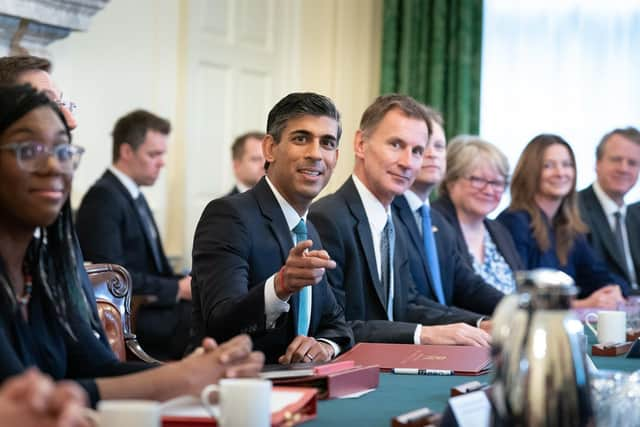How it might get easier for Prime Minister Rishi Sunak to govern - Dr Christopher Byrne
And all of this has happened against a backdrop of the Ukraine War and Britain’s slow emergence from a once-in-a-lifetime pandemic.
Nevertheless, there are reasons why British politics might become calmer in the near term, making it easier for Prime Minister Rishi Sunak to actually govern.
Advertisement
Hide AdAdvertisement
Hide AdThe biggest recent challenges have been double digit inflation, rooted in spiralling energy costs, and rapid interest rate rises driving the UK economy into recession and pushing up the cost of government borrowing.


However, gas prices are already down by roughly two-thirds from their peak (albeit not yet for ordinary consumers), and if the Ukraine War is concluded soon, perhaps in early 2023, then the chief cause of the initial spike in prices will have been removed.
When they fall, interest rates will follow, easing pressure on families with mortgages and potentially kickstarting economic growth.
The cost of government borrowing will also fall, reducing the need to cut public spending and/or raise taxes.
Advertisement
Hide AdAdvertisement
Hide AdIndeed, the cost of government borrowing has already fallen significantly with Sunak’s replacement of Liz Truss, whose experiment in debt-fuelled tax cuts for high earners and corporations cratered the pound.
In other words, Prime Minister Sunak may be the big beneficiary of the ‘things can only get better’ effect: Within the space of the next two years—meaning, before the next general election—many of the big economic problems facing the country will likely have abated, and he will be able to go to the electorate with inflation under control, interest rates significantly lower than the expected 6 percent under the Truss/Kwarteng plan, and the economy growing again.
Counting on that would be wishful thinking for Sunak though. This is because many of the problems his government faces have deep structural causes and won’t be solved by a change of personnel.
Chief among these is that US leadership of the world economy seems to be waning fast, which is a problem for the UK, as an open trading nation with very little ability to go it alone.
Advertisement
Hide AdAdvertisement
Hide AdThis is due to a combination of escalating US-China tensions and Russia’s challenge to NATO in Eastern Europe.
Indeed, there is now the very real possibility of a Chinese invasion of Taiwan, which would be more destabilising for Britain and the whole world than the Ukraine War by several orders of magnitude.
On top of that, there is evidence that the public’s support for the kinds of neoliberal policies Prime Minister Sunak is likely to pursue is in long-term decline, and although the ongoing realignment of the electorate seemed to benefit the Conservatives in 2019, it looks increasingly likely that this was a fairly exceptional ‘Brexit election’.
The Conservatives made a net gain of 48 seats in the 2019 General Election winning a landslide majority of 80 seats. Many of the gains were in long-held Labour ‘Red Wall’ seats.
Advertisement
Hide AdAdvertisement
Hide AdIn the past few weeks Labour has enjoyed as much as a 39-point lead in opinion polls over the Conservatives, suggesting that many of those Red Wall voters thought to have abandoned Labour three years ago are seriously reconsidering.
Another big challenge Sunak faces is devising an economic policy capable of simultaneously ‘Levelling Up’ economically struggling parts of the country while also cutting taxes in the medium term and retaining the City of London’s status as a global financial centre.
The difficulty of achieving these conflicting aims was most starkly illustrated with the cancellation of the Leeds leg of the HS2 rail network late last year.
What other flagship Northern Powerhouse and Levelling Up policies might need to be sacrificed in the coming years as we enter the second ‘age of austerity’ in just a decade?
Advertisement
Hide AdAdvertisement
Hide AdThat is without even mentioning the challenge of figuring out Britain’s new place in the world after Brexit.
One thing the Truss experiment did prove is that ‘Singapore-on-Thames’ is economically and politically not viable.
What might replace it is unclear, especially given the intractability of problems with the Northern Ireland Protocol, which continues to sour relations with the EU.
Meanwhile, support for Scottish independence has hardly abated and there is a very real possibility Sunak could preside over the break-up of the United Kingdom if, as Nicola Sturgeon wishes, there is a second independence referendum in 2023.
Dr Christopher Byrne is senior lecturer in politics at the Leeds School of Social Sciences.